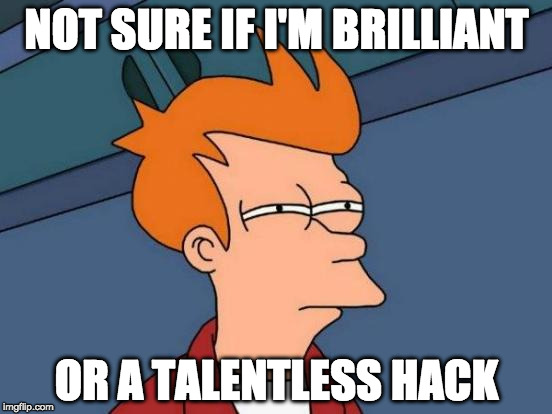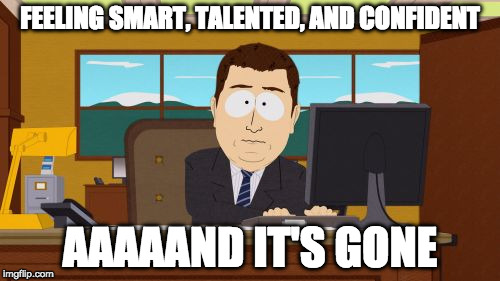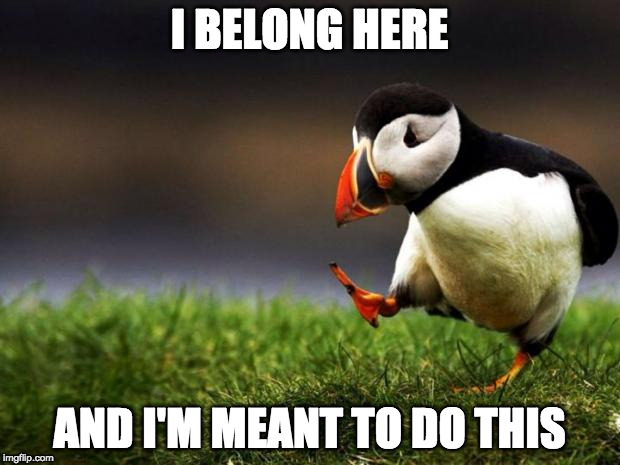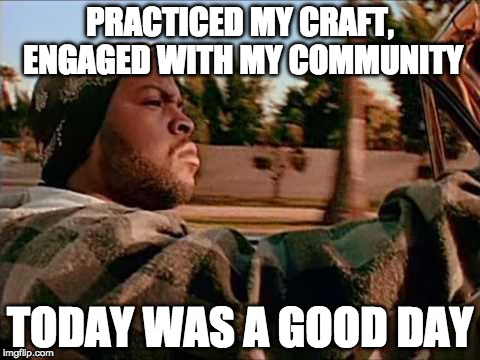How to Get Over Your Imposter Syndrome
You just finished making a thing.
Perhaps it was a short story, a collection of photographs, a painting, or an essay. Now you sit staring at your creation, analyzing it, and wondering, "Is it good enough?"
Am I good enough?
Here's another scenario. You go to a networking event where a lot of people from your field will be present. It's an opportunity to make connections with others who do similar types of work, to share some of your work and see theirs, and maybe even to give a presentation. But as soon as you walk into the event venue, you start to feel a something holding you back from mingling and speaking with these other professionals. Your internal heckler makes an appearance. "You're not as good as these people," it tells you. "You don't have as much experience as they do." "Your work is amateur compared with theirs." "You have no audience. Your only fan is your Mom. You're a fraud. Why should these people give you the time of day?"
"You don't belong here."

Or how about this one: You make a thing, and you go ahead and publish or share it. People respond well. You get a few accolades. No one seems to hate it. But in the back of your mind, you're thinking, "It's not that good. This positive response is just a fluke." You feel that you are hopelessly inadequate in your chosen field, and that any success you experience is only the result of some connection you have made, or some circumstance external to you, or just blind luck.
If any of these scenarios sound familiar to you, then it sounds like you've had a brush or two with Imposter Syndrome.
Impostor syndrome (also known as impostor phenomenon or fraud syndrome or the imposter experience) is a concept describing high-achieving individuals who are marked by an inability to internalize their accomplishments and a persistent fear of being exposed as a "fraud". Source: Wikipedia
(Just reading this definition can make your Imposter Syndrome kick in. "Oh, it says here that high-achieving individuals get it. I wouldn't exactly call myself a high-achiever. I guess I don't have Imposter Syndrome. I'm an actual fraud.")
But guess what? These feelings are normal. Most ambitious, creative people encounter Imposter Syndrome at least once in their lives, and many people struggle constantly with it.

Those other people at the networking event? The ones who all had more experience, bigger audiences, and produced better work than you? Chances are, they have had these same thoughts and feelings. They might even be having them right now.
Don't believe me? Just ask these two luminaries:
"I have written eleven books. But each time I think Uh oh, they're going to find out now. I've run a game on everybody and they're going to find me out." - Maya Angelou
"The exaggerated esteem in which my lifework is held makes me very ill at ease. I feel compelled to think of myself as an involuntary swindler." - Albert Einstein
See? Even the most successful, brightest, and talented among us often feel like they are not good enough, don't belong, or have somehow fooled people into being interested in their work.
But why do we feel that way? And how can we stop it?
Having Imposter Syndrome doesn't mean that you're a talentless hack or that your work sucks. It means that there's a part of you that believes success is for other people, and not for you.
But, so what if you're not as good as some other people in your field? Stop comparing yourself to others. Have you done your best work? Are you committed to improving? Are you better than you were when you started?
As a writer, I deal with Imposter Syndrome by reminding myself that:
- I am not as good of a writer as I will become, and that's okay.
- I am proud of my accomplishments and my continual improvement.
- I can build an audience while I'm becoming a better writer. People who like my writing will be as happy to see my progression as I am.
- My creations will have served their purpose if people read and think about them. They will not serve their purpose sitting on my hard drive.
- I work hard, and I deserve success.
- I belong here.
- This is what I'm meant to do.
Some of these can become daily affirmations or mantras to repeat, if your Imposter Syndrome is particularly strong and persistent. Or, if your Imposter Syndrome only makes an appearance at certain times (like when you're about to click "Post" on Steemit, or you're attending a networking convention), use these phrases to pump yourself up before facing the thing that scares you.

If you know you've put in a lot of practice and taken the time to learn about your craft, don't wait to share your work with others just because you're "not published yet" or you "don't have a degree/agent/audience/subscriber list". If you're still early in your career and you don't want to put your work out there for the whole world to see yet, then find a critique group to share it with. Get used to sharing it, and get used to taking both positive and negative criticism on your work.
Whatever you do, don't keep your creations locked away in a vault, only to be discovered posthumously by your grandchildren.
Show your work. Let other people see the weird thing you made. What else are you here for?

Imposter Syndrome looks a little like humility from a certain angle, but it's not. It's self sabotage. One method of combating Imposter Syndrome is by cultivating true humility.
What does that mean?
It means recognizing that you are just a person who loves to do a thing. There is nothing special about you that will guarantee your success, but at the same time there is nothing special about you that makes you undeserving of success. So work hard, learn as much as you can, and, no matter where you are on the ladder of success, always keep improving.

Have you experienced Imposter Syndrome before?
What, if anything, did you do to overcome it? Tell me in the comments!
I love you, Steemit!
Hi! My name is Leslie Starr O'Hara, but my friends call me Starr. I live in the mountains of North Carolina and I write humor, fiction, musings, and essays here on Steemit.
Upvotes and ReSteems are amazing!

Have you read Mindset, by Dr. Carol Dweck? I'm convinced that impostor syndrome is actually a part of your personality that is fixed, that is to say, has a fixed mindset.
She advocates giving your fixed mindset a name, and then telling it to shut up every time she whispers in your ear! :-)
Cryptogee
I'll have to check that book out!
I'm going to name my fixed mindset Edmond.
Nice, mine's called Nigel :-)
Cg
Good job on making the career change. I think imposter syndrome affects anyone who is good at what they do - it means you have a critical eye and recognize the potential for improvement. Problems arise when you give that critical eye too much free reign and it stops you before you even begin.
It's a balancing act.
Thanks so much for this post. This is exactly what I struggle with, always doubting if what I'm doing is even remotely passable for other people (it usually is). Drives me crazy sometimes and I can't shake it. The only thing that relieves it is positive feedback from clients or colleagues. Or even some constructive criticism, which actually means that I'm headed somewhere.
Really like this. It hits home. Never thought of it this way before! THANK YOU!
Great stuff Leslie! This is similar to what Kyle Cease says: "Don't hoard your content." Or, what Jeff Berwick recently said on a video (paraphrased): "If you want to make sombreros for hamsters then do that! There are billions of people on the internet, there is bound to be some people interested in what you are doing."
I couldn't agree more. Especially now, in the Information Age, there are plenty of niches to go around and building an audience for your work is easier than it's ever been.
Couldnt read all of this right now because im at work, but this sounds exactly like me and i cant wait to Finish it!
Awesome! Let me know your thoughts when you've finished reading it!
I feel like a lot of people need to hear this. It can definitely be hard to be confident in myself sometimes even when I know I should be and deserve to be. Thanks for the tips!
good blog.
are you made by yourself sir ?
Those that can't get over it tend to let it sabotage their work.
Very insightful content on an overlooked condition.
It's likely that many of us have "imposter syndrome." Those that do not have it are probably egocentric – or even egomaniacs.
The good thing is that those of us who have the syndrome do not base our thoughts and actions on our ego. Instead of focusing on ourselves, we focus on the world, our fellow human beings, and on how we can improve the world and our family and friends. And hopefully, our work reflects that.